How to Say “Nothing,” “Nowhere,” and “No one” in Japanese – Review Notes
In our last grammar lesson, we learned the indefinite pronouns “something,” “somewhere,” and “someone” in Japanese.

Continuing the theme, today we focused on what we call “no” words, words like “nothing” and “nowhere,” in Japanese.
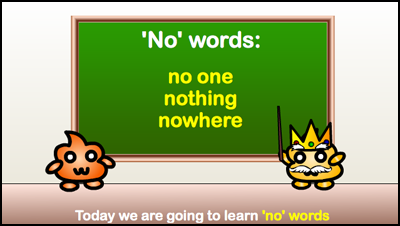
We learned that you can make a “no” word by adding the particle も (mo) to a question word and using it in a negative sentence!
In these video review notes we will learn more information about today’s grammar, including what happens if you use the same words in a positive sentence.
………………………………………………………………………………..
How to make ‘no’ words in Japanese:
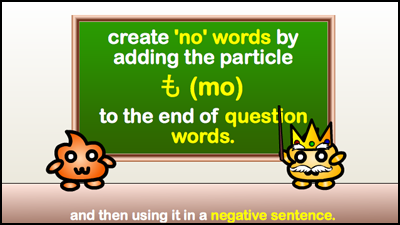
★ To make a ‘no’ word in Japanese, you add the particle も (mo) to the end of a question word, and then use it in a negative sentence.

★ だれ (dare) means who in Japanese.
★ When it is used in a negative sentence, だれも (daremo) means no one or not anyone.
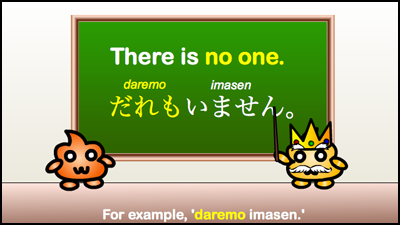
★ For example, だれもいません (daremo imasen) means ‘There is no one‘ or ‘There isn’t anyone.’
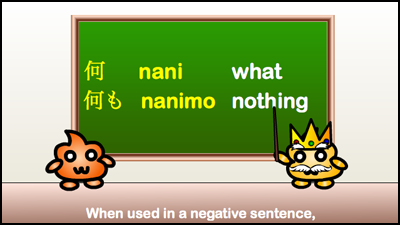
★ 何 (nani) means what in Japanese.
★ When it is used in a negative sentence, 何も (nanimo) means nothing or not anything.
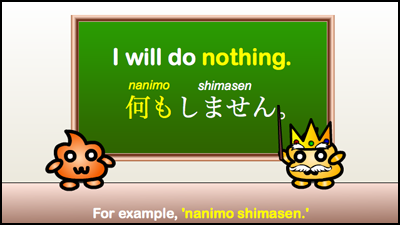
★ For example, 何もしません (nanimo shimasen) means ‘I will do nothing‘ or ‘I won’t do anything.’
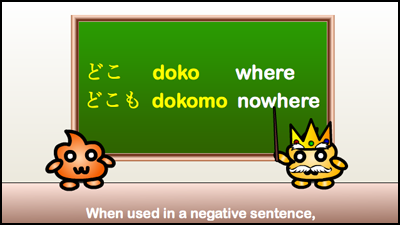
★ どこ (doko) means where in Japanese.
★ When it is used in a negative sentence, どこも (dokomo) means nowhere or not anywhere.
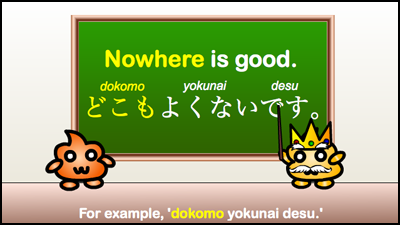
★ For example, どこもよくないです。 (dokomo yokunai desu) means ‘nowhere is good‘ or ‘none of the places are good.’
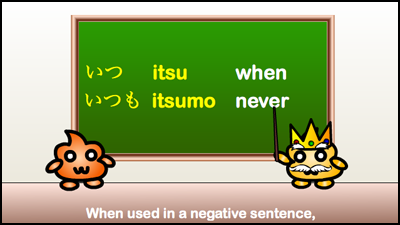
★ いつ (itsu) means when in Japanese.
★ When it is used in a negative sentence, いつも (itsumo) means never.
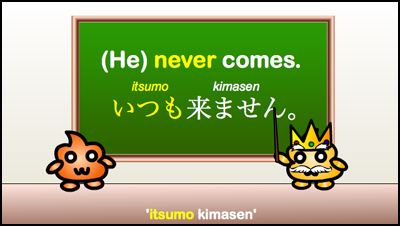
★ For example, どこもよくないです。 (itsumo kimasen) means ‘(he) never comes‘ or ‘(he) always doesn’t come.’
………………………………………………………………………………..
Using these words in a positive sentence:
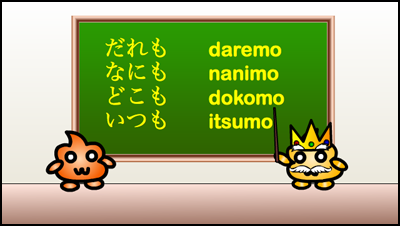
★ When the words that we learned today are used in a positive sentence, they are not ‘no’ words; they are ‘every’ words. The meaning of these words is opposite when used in a positive sentence.
When used in a positive sentence:
だれも daremo everyone
何も(かも) nanimo (kamo) everything
どこも dokomo everywhere
いつも itsumo every time / always
………………………………………………………………………………..
Example 1:
だれもが彼女を知っている。
Daremo ga kanojo o shitteiru.
Everyone knows her.
★ みんな (minna) also means ‘everyone’ in Japanese, and can be used in place of だれも (daremo).
………………………………………………………………………………..
Number 2:
何もかもうまくいっている。
Nanimo kamo umaku itteiru.
Everything is going well.
★ 何も (nanimo) when used in a positive sentence to mean ‘everything’ is almost always used as part of the noun phrase 何もかも (nanimo kamo).
★ すべて (subete) and 全部 (zenbu) are other common words that mean ‘everything.’ Generally, you can use either one of them in place of 何もかも (nanimo kamo).
………………………………………………………………………………..
Number 3:
春になるとどこも美しく見える。
Haru ni naru to dokomo utsukushiku mieru.
When it becomes Spring, everywhere looks beautiful.
………………………………………………………………………………..
Number 4:
彼女はいつも忙しい。
Kanojo wa itsumo isogashii.
She is always busy.
………………………………………………………………………………..
Using Particles with ‘no’ words:
★ When using words like だれも、なにも、どこも、and いつも, most of the particles that you would normally need to use do not have to be used.
★ Particles like は, も, が, and を are not used. However, other particles like に and へ are used when needed and should be put between the question word and も.
………………………………………………………………………………..
★ Direction particles に and へ are used with どこも when needed. For example:
どこにも行きませんでした。
Doko ni mo ikimasen deshita.
I didn’t go anywhere.
or…
どこへも行きませんでした。
Doko e mo ikimasen deshita.
I didn’t go anywhere.
……………………………………………………………………………….
★ Other uses of the particle に are also retained. For example, in Japanese when you want to say “say to someone” or “tell someone” you use 誰かに言う (dareka ni iu). The negative version of this pattern is:
誰にも言わない。
Dare ni mo iwanai.
I won’t say to anyone. / I won’t tell anyone.
……………………………………………………………………………….
★ If you put the particle で between the question word and も, the meaning changes to any~
だれでも daredemo anyone
なんでも nandemo anything
どこでも dokodemo anywhere
いつでも itsudemo anytime / whenever
★ These words are usually used in a positive sentence, but some of them can also be used in a negative sentence.
……………………………………………………………………………….
Conclusion:
Today we learned how to use question words + (particle) + も to say ‘no’ words in a negative sentence, and ‘any’ words in a positive sentence!
This lesson contained a lot of information, so make sure to go back and review the places that were hard for you!
……………………………………………………………………………….
Do you want a Japanese tutor?
Take Japanese Skype Lessons with Professional Japanese Teachers on kakehashijapan.com!
………………………………………………………………………………..
………………………………………………………………………………..









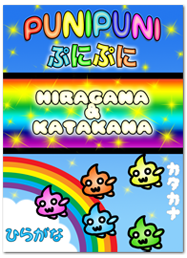
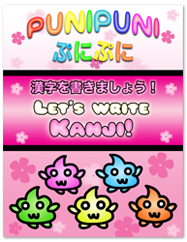


one comment
I’m just wondering, since I have heard in some japanese dramas when they sometimes say なんでもない, which is suppose to mean nothing or not anything? But could they use 何も instead and still mean that? Or is it better to use なんでもない?
Comment by marta on 09/05/2014 at 6:38 am